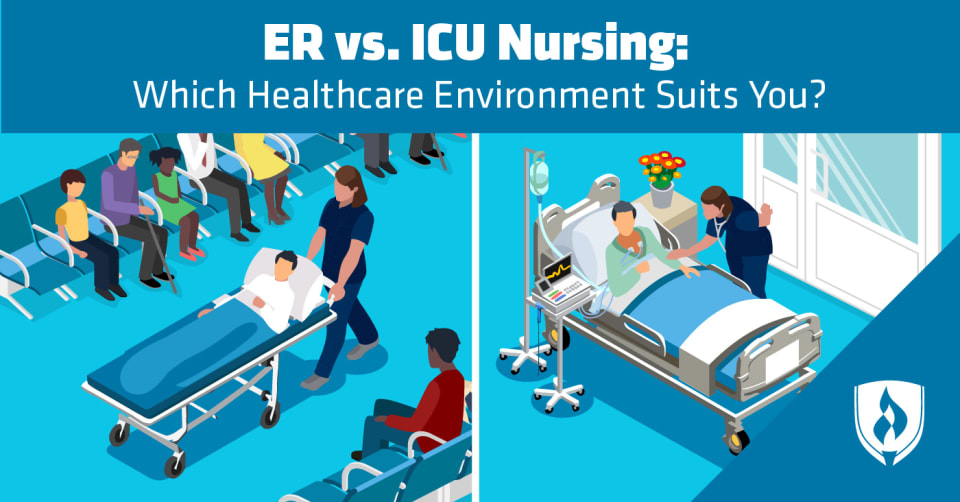
You’re confident in your decision to become a nurse. With your caring personality and ability to keep calm in any situation, you know that this is the right next step for your career. What’s less clear is the nursing work environment that will be the best fit for your skills and characteristics.
Not all hospital nursing positions are the same. You think you’ve narrowed your options down to working in the emergency room (ER) or intensive care unit (ICU)—but now you’re stumped. What exactly is the difference between nursing in the ER or the ICU?
You have a lot to learn about ER versus ICU nursing so you can make the choice that’s best for you and the patients you’ll care for. Join us as we compare ER nursing skills and ICU nursing skills and explore how these roles may fit you.
Get Your Nursing School Questions Answered at a Nursing Information Session
ER vs. ICU: The basic breakdown
Both ER and ICU nurses are concerned with tending to patients who are experiencing urgent, severe or even life-threatening medical conditions. However, there are some key differences in how these two hospital units function. “In a sense, the emergency room and the intensive care unit are two of the most different areas of the hospital,” says registered nurse Sonia Allec.
If you’ve ever broken a bone or suffered a significant injury, you’ve probably had some firsthand experience with the emergency room. The ER is the hospital department that treats patients with acute medical conditions, like heart attacks or severe injuries. The ER is open day and night to care for patients in emergency situations. Patients may admit themselves or arrive to the ER by ambulance, but emergency room visits are not planned in advance.
Most people are a bit less familiar with the intensive care unit. This area of the hospital provides round-the-clock treatment to patients who have a life-threatening medical condition. Patients may be transferred to the ICU after first being stabilized in the ER or having an unexpected medical condition, while others have planned ICU stays, such as patients recovering from certain surgeries. Patients experiencing severe complications from a chronic illness may also be admitted to the ICU.
ER vs. ICU nursing: Job duties
Though both the ER and ICU are committed to healing patients in urgent or life-threatening situations, the job duties in the ER vs. ICU are surprisingly different. “The ER is very fast-paced, and you are expected to make your assessment and diagnosis for a patient as quickly as possible,” Allec says.
ER nurses must be comfortable with triaging patients to determine whose needs are most pressing, even across a wide variety of medical conditions, such as “injuries resulting from motor vehicle accidents as well as acute-onset conditions such as heart attacks,” Allec says. ER nurses cycle through patients quickly, sometimes up to 10 per shift. “After the patient has been stabilized, he or she is either released or sent to a different department, and then it’s on to the next patient.”
ICU nurses have nearly an opposite experience, providing detailed care and close monitoring to just one or two patients per shift. “You’re often dealing with critically ill patients who may have already been receiving treatment for some time,” Allec says. “You’re working with patients on a long-term basis.”
In addition to having an established relationship with patients, ICU nurses experience a more regulated work environment. They follow strict protocols and procedures to keep their vulnerable patients safe. “There’s a bit more precision as each patient already has a long-term care plan established,” Allec says.
ER vs. ICU nursing: Skills needed
ER and ICU nurses both receive the necessary medical training to care for patients, but there are some innate personality traits that could make RNs a better fit for one department or the other.
The hectic emergency room comes with surprises each shift, and it can become a noisy, high-pressure work environment. “The number one non-technical skill in the ER is the ability to remain calm under pressure, because believe me when I say there’s a lot of pressure in the ER,” Allec says.
If you’re a high-energy person who’s able to think on your feet and remain calm in a crisis, you could have what it takes to work in the high-pressure world of ER nursing.
The ICU lacks the urgency of the ER, but the stakes are still high with patients fighting for their lives. The ICU nursing skills that come in handy are the ability to follow procedures and a sharp eye for detail. “Keen observation skills are paramount in the ICU,” Allec says. “You have to be able to pick up on more subtle changes in a patient’s condition.”
If you want to establish ongoing relationships with patients and their families and are detail-oriented enough to follow the particular set of procedures a patient needs, you might find your calling as an ICU nurse.
Nursing superheroes
No matter whether emergency room versus intensive care unit nursing is right for you, there’s no denying that RNs in both specialties save lives in their daily work. The first step to becoming one of these medical heroes is to attend nursing school.
Going to nursing school is more accessible than you might think! Learn more with our article “How to Get Into Nursing School: Your Step-by-Step Guide.”




